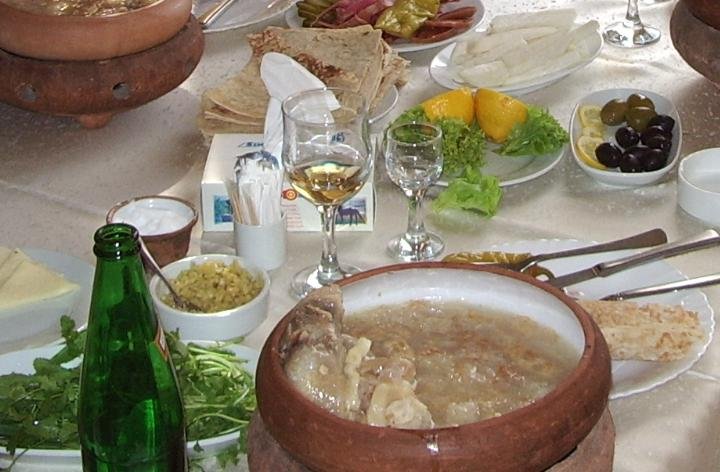Growing up in a multi-generational Armenian household, New Year’s Eve was much like Saturday mornings, except the laundry and cleaning were on turbo drive. You see, the Armenian women in my family faithfully believed that starting a new year with dirty laundry, dirty house and dirty sheets would carry over the dirty demons from the previous year. And that meant the hampers needed to be completely emptied before any celebrations began.
Fast forward to the next generation, when I waived the Saturday morning cleaning rituals with my children but not the New Year’s Eve laundry and cleaning extravaganza. You can decide whether this is an Armenian superstition, folktale or tradition. As for me, I’m too afraid to care about the difference and believe my mother Rose and grandmother Lucy will haunt me from Heaven if I don’t comply. Now that my children are grown and on their own, they dodge my texts leading up to and on New Year’s Eve knowing full well what I will be checking on. Thankfully, there are young grandchildren to indoctrinate and keep the tradition moving forward.
Ironically, this ritual has become much more than a to-do item on a checklist, but rather a beloved homage to my ancestral traditions. It tickled my curiosity to discover more rituals that are celebrated by Armenians and many other cultures around the world. Here are a few:
Food and Drink
Unsurprisingly, a significant portion of rituals for Armenians and other ethnicities include food and drinks that are doused with good luck. Friends from the Armenian Cooking Facebook group speak of gatherings with family and friends to enjoy traditional dishes ranging from full course meals of pilaf, turkey or roast beef and beloved side dishes of kufte, sarma and boreg to sweet and salty desserts like paklava and assorted nuts and dried fruits. Many families pray at the stroke of midnight, kiss and exchange gifts. Some even talk about the benefits of khash (cow hooves simmered overnight for a roasted broth) on New Year’s Day to cure hangovers, including the late, great Anthony Bourdain on his 2017 Parts Unknown episode titled “Anthony Bourdain – Khash in Armenia.” The experience wouldn’t be complete without the guests raising glasses of spirits with a toast for the hosts and the khash makers that is loosely translated as, “Let my feet bring luck to your home.”

Many cultures combine food with a game of chance, such as in Greece where a clean penny is baked into pita (spinach pies), and the lucky finder is said to have good fortune for the year. Other cultures combine food with symbolic origins, such as in Japan where eating a bowl of long thin soba noodles (firm yet easy to bite) is believed to symbolize a literal break away from the old year, signifying a new beginning. Additionally, some cultures associate fish as an auspicious New Year’s dish, as fish swim forward, mirroring the forward movement of time.
First Footing
The first person who walks through your doors on New Year’s Day may set the tone for the new year. In Albania, if it’s a small child, preferably a little boy who enters the house, the year will go well. But even more importantly, the person must enter with their right foot first. Similarly, in Scotland the first person to cross the threshold into one’s home indicates the theme of the year to come. Stemming from the days of Viking invasions, if the first footer is a tall and dark man, the year will be protected against the Vikings.
Water
As one of the critical elements of earth that drives the ebbs and flow of life, using water as a symbolic gesture is a natural place for new beginnings. Brazilians head to the warm beaches at midnight to jump seven waves while making seven wishes. In colder climates, people have flocked to freezing cold water for a ritual known as a Polar Bear Plunge since 1920, albeit without an origin of good luck. The ritual was started by a swimming enthusiast who felt that everyone should swim once a day, and it has become a philanthropic tradition to raise funds for charitable causes. In Puerto Rico, many believe that dumping a bucket of water out the window drives away evil spirits, while other cultures send their children running around the house to turn on faucets at midnight.
While there are no guarantees that any New Year tradition will make the year ahead a better one, there’s no harm in trying something new to ring in the new year with a fresh start.
Making Noise
Whether it’s the squeaky sound of party horns at the stroke of midnight, the unconventional tradition in Denmark of throwing plates and glasses at loved ones’ front doors for good luck, or the practice of banging pots and pans to ward off demons—New Year’s Eve celebrations around the world are here to stay.
While there are no guarantees that any New Year tradition will make the year ahead a better one, there’s no harm in trying something new to ring in the new year with a fresh start. And take it from me, if you want to make an Armenian mother or grandmother happy, call her at midnight to tell her that you have finished your laundry and have clean sheets on your bed. That should start fresh beginnings for both of you!
Happy New Year, and may our feet bring good luck to each other’s homes.



Heartwarming and sweet. The Khash is a distant memory, the housecleaning ritual not so much. Thank you and keep those stories coming.
My Armenian acquaintances from Arab countries made Anush Abour – sweet soup known in English as Christmas soup – with apricots and raisins and other good stuff in a wheat paste base.